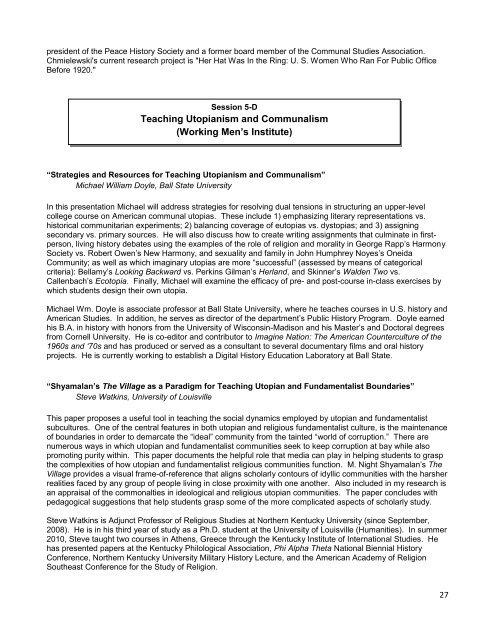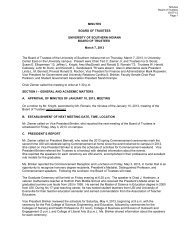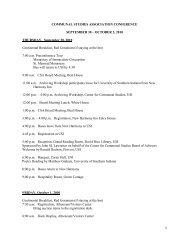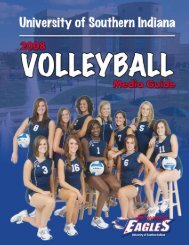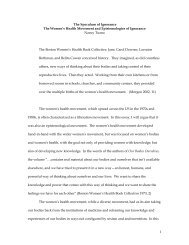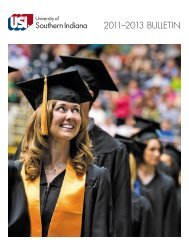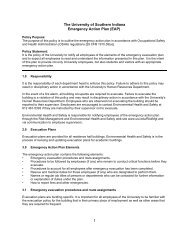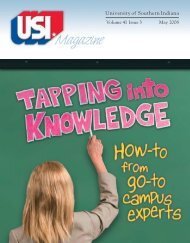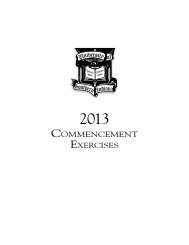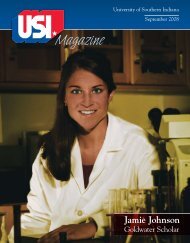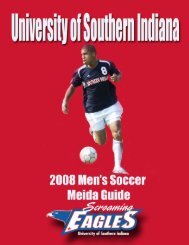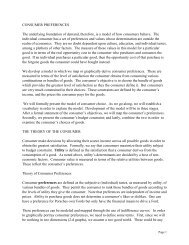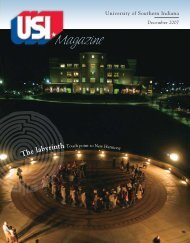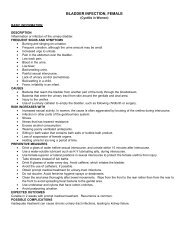Communal Studies Association, 2010 New Harmony, Indiana ...
Communal Studies Association, 2010 New Harmony, Indiana ...
Communal Studies Association, 2010 New Harmony, Indiana ...
You also want an ePaper? Increase the reach of your titles
YUMPU automatically turns print PDFs into web optimized ePapers that Google loves.
president of the Peace History Society and a former board member of the <strong>Communal</strong> <strong>Studies</strong> <strong>Association</strong>.Chmielewski's current research project is "Her Hat Was In the Ring: U. S. Women Who Ran For Public OfficeBefore 1920."Session 5-DTeaching Utopianism and <strong>Communal</strong>ism(Working Men‟s Institute)“Strategies and Resources for Teaching Utopianism and <strong>Communal</strong>ism”Michael William Doyle, Ball State UniversityIn this presentation Michael will address strategies for resolving dual tensions in structuring an upper-levelcollege course on American communal utopias. These include 1) emphasizing literary representations vs.historical communitarian experiments; 2) balancing coverage of eutopias vs. dystopias; and 3) assigningsecondary vs. primary sources. He will also discuss how to create writing assignments that culminate in firstperson,living history debates using the examples of the role of religion and morality in George Rapp‘s <strong>Harmony</strong>Society vs. Robert Owen‘s <strong>New</strong> <strong>Harmony</strong>, and sexuality and family in John Humphrey Noyes‘s OneidaCommunity; as well as which imaginary utopias are more ―successful‖ (assessed by means of categoricalcriteria): Bellamy‘s Looking Backward vs. Perkins Gilman‘s Herland, and Skinner‘s Walden Two vs.Callenbach‘s Ecotopia. Finally, Michael will examine the efficacy of pre- and post-course in-class exercises bywhich students design their own utopia.Michael Wm. Doyle is associate professor at Ball State University, where he teaches courses in U.S. history andAmerican <strong>Studies</strong>. In addition, he serves as director of the department‘s Public History Program. Doyle earnedhis B.A. in history with honors from the University of Wisconsin-Madison and his Master‘s and Doctoral degreesfrom Cornell University. He is co-editor and contributor to Imagine Nation: The American Counterculture of the1960s and „70s and has produced or served as a consultant to several documentary films and oral historyprojects. He is currently working to establish a Digital History Education Laboratory at Ball State.“Shyamalan‟s The Village as a Paradigm for Teaching Utopian and Fundamentalist Boundaries”Steve Watkins, University of LouisvilleThis paper proposes a useful tool in teaching the social dynamics employed by utopian and fundamentalistsubcultures. One of the central features in both utopian and religious fundamentalist culture, is the maintenanceof boundaries in order to demarcate the ―ideal‖ community from the tainted ―world of corruption.‖ There arenumerous ways in which utopian and fundamentalist communities seek to keep corruption at bay while alsopromoting purity within. This paper documents the helpful role that media can play in helping students to graspthe complexities of how utopian and fundamentalist religious communities function. M. Night Shyamalan‘s TheVillage provides a visual frame-of-reference that aligns scholarly contours of idyllic communities with the harsherrealities faced by any group of people living in close proximity with one another. Also included in my research isan appraisal of the commonalties in ideological and religious utopian communities. The paper concludes withpedagogical suggestions that help students grasp some of the more complicated aspects of scholarly study.Steve Watkins is Adjunct Professor of Religious <strong>Studies</strong> at Northern Kentucky University (since September,2008). He is in his third year of study as a Ph.D. student at the University of Louisville (Humanities). In summer<strong>2010</strong>, Steve taught two courses in Athens, Greece through the Kentucky Institute of International <strong>Studies</strong>. Hehas presented papers at the Kentucky Philological <strong>Association</strong>, Phi Alpha Theta National Biennial HistoryConference, Northern Kentucky University Military History Lecture, and the American Academy of ReligionSoutheast Conference for the Study of Religion.27


